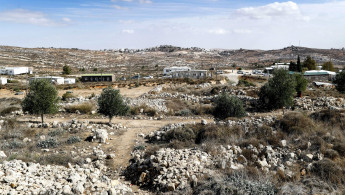Israel seeks postponement of 'illegal' Amona settlement eviction
The Israeli government is set to ask the country's high court of justice to postpone for one month the evacuation of the Amona outpost in the occupied West Bank, according to reports from Israeli media on Friday.
Residents have been ordered to leave the area by 25 December in accordance with a previous high court ruling dating back to December 2014.
The case has repeatedly appeared before the high court in the past 15 years.
Earlier this week, Israeli Prime Minister Binyamin Netanyahu claimed that a delay in the evacuation process was necessary to ensure temporary housing for around 40 families would be ready.
According to a report on Israel's Channel 2 News on Thursday hundreds of Israeli security personnel conducted training at the Tzeelim military base in the Negev desert in preparation for the eviction.
Meanwhile, supporters of the Amona settlement - which was built on private Palestinian-owned land - have called on fellow citizens from all over the country to travel to the outpost to prevent the evacuation.
The Israeli government had proposed that residents of Amona could temporarily relocate to three plots of land located close to the settlement which attorney's claimed were administered by Israel's custodian for absentees' property.
The plan was approved by Israel's attorney general on Sunday.
However, Palestinians in the village of Silwad have expressed objection to such a proposal, denying that such land is "abandoned".
They produced proof of ownership documents to back up their claims, according to a correspondent with The New Arab’s Arabic publication.
On Wednesday, the Knesset approved a controversial bill viewed by critics as a step towards legalising thousands of settler homes that, like Amona, were built on private Palestinian land.
The regulation bill was originally intended to be used to prevent the demolition of Amona and has been criticised as a violation of international law by the US, the EU, and the UN.



